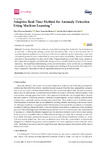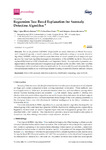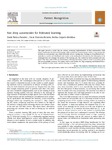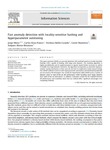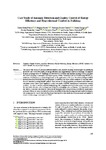Buscar
Mostrando ítems 1-8 de 8
Adaptive Real-Time Method for Anomaly Detection Using Machine Learning
(MDPI AG, 2020-08-20)
[Abstract]
Anomaly detection is a sub-area of machine learning that deals with the development of methods to distinguish among normal and anomalous data. Due to the frequent use of anomaly-detection systems in monitoring ...
Regression Tree Based Explanation for Anomaly Detection Algorithm
(MDPI AG, 2020-08-18)
[Abstract]
This work presents EADMNC (Explainable Anomaly Detection on Mixed Numerical and Categorical spaces), a novel approach to address explanation using an anomaly detection algorithm, ADMNC, which provides accurate ...
Fast deep autoencoder for federated learning
(Elsevier Ltd, 2023-11)
[Abstract]: This paper presents a novel, fast and privacy preserving implementation of deep autoencoders. DAEF (Deep AutoEncoder for Federated learning), unlike traditional neural networks, trains a deep autoencoder network ...
Fast anomaly detection with locality-sensitive hashing and hyperparameter autotuning
(Elsevier, 2022-08)
[Abstract]: This paper presents LSHAD, an anomaly detection (AD) method based on Locality Sensitive Hashing (LSH), capable of dealing with large-scale datasets. The resulting algorithm is highly parallelizable and its ...
Large scale anomaly detection in mixed numerical and categorical input spaces
(Elsevier, 2019)
[Abstract]: This work presents the ADMNC method, designed to tackle anomaly detection for large-scale problems with a mixture of categorical and numerical input variables. A flexible parametric probability measure is ...
Data-driven predictive maintenance framework for railway systems
(IOS Press, 2023)
[Abstract]: The emergence of the Industry 4.0 trend brings automation and data exchange to industrial manufacturing. Using computational systems and IoT devices allows businesses to collect and deal with vast volumes of ...
Case Study of Anomaly Detection and Quality Control of Energy Efficiency and Hygrothermal Comfort in Buildings
(2019)
[Abstract] The aim of this work is to propose different statistical and machine learning methodologies for identifying
anomalies and control the quality of energy efficiency and hygrothermal comfort in buildings. ...
Explained anomaly detection in text reviews: Can subjective scenarios be correctly evaluated?
(2024-07)
In the current landscape, user opinions exert an unprecedented influence on the trajectory of companies. In the field of online review platforms, these opinions, transmitted through text reviews and numerical ratings, ...


